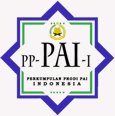IMPLEMENTASI MODEL PEMBELAJARAN KONSTRUKTIVISME DALAM MENINGKATKAN HASIL BELAJAR SISWA DALAM PENDIDIKAN AGAMA ISLAM PADA KOMPETENSI DASAR BERIMAN KEPADA QADA DAN QADAR BERBUAH KETENANGAN HATI
Abstract
The main problem in this study is the low learning outcomes of students of class XI F in teh second semester of SMP N 1 Limpung Batang in academic year 2018/2019 on Islamic Education subjects. One factor that causes low student ability is the teaching method that has been used so far tends to make students passive and teacher-centered. To improve student learning outcomes, the researchers applied the constructivism approach in teaching PAI in class XI F of SMP N 1 Limpung, Batang in the theme of “Beriman Kepada Qada dan Qadar Berbuah Ketenangan Hati.” Which became the focus of research for students of class XI F, amounting to 33 students. Research location at Limpung 1 Junior High School in Batang Regency. This research is a classroom action research, carried out in 2 cycles, each cycle consisting of 4 stages: planning, action, observation, and reflection. From the results of Cycle 1 actions, the classical learning completeness was 70% with an average score of 72.78. Cycle 2 results obtained 97% classical learning completeness with an average value of 84.88. Thus it can be concluded that the implementation of constructivism learning models can improve the learning outcomes of class XI F students of SMP N 1 Limpung Batang Regency.
Keywords
Full Text:
PDFReferences
Adom, Dickson; Akwasi Yeboah & Attah Kusi Ankrah. “Constructivism Philosophical Paradigm: Implication for Research, Teaching, and Learning.” Global Journal of Arts Humanities and Social Sciences, Vol. IV, No.10 (2016): 1-9.
Ahmad, Al-Huneidi. Constructivism Based Blended Learning in Higher Education. Universiteit Hasselt, 2018.
Akyol, Semra & Seval Fer. “Effects of Social Constructivist Learning Environment Design on 5th Grade Leaners’ Learning.” Procedia-Social and Behavioral Sciences, Vol. 9 (2010): 948-953.
Bada & Steve Olusegun. “Constructivism Learning Theory: A Paradigm for Teaching and Learning.” IOSR Journal of Research & Method in Education, Vol. 5, No. 6 (2015): 66-70.
Beck, Clive and Clare Kosnik. A Social Constructivist Approach. Albany: State University of New York Press, 2006.
Bhattacharjee, Jayeeta. “Constructivist Approach to Learning– An Effective Approach of Teaching Learning.” International Research Journal of Interdisciplinary & Multidisciplinary Studies (IRJIMS), Vol. I, No.6 (2015): 65-74.
Bogar, Yurdagul; Suna Kalender & Mustafa Sarikaya. “The Effect of Constructive Learning Method on Students’ Academic Achievement Retention of Knowledge, Gender and Attitudes Towards Science Course in ‘Matter of Structure and Chraracteristic’ Unit.” Procedia-Social and Behavioral Sciences, Vol. 46 (2012): 1766-1770.
Bostock, S.J. “Constructivism in Mass Higher Education: A Case Study.” British Journal of Educational Technology, Vol. 29, No. 3 (1998): 225-240.
Brooks, Jacqueline Grennon & Martin G. Brooks. In Search of Understanding: The Case for Constructivist Classrooms. Alexandria: Association for Supervision and Curriculum Development, 1999.
Combs, Warren E. & Kathy Wilhelmsen. “In-Class ‘Action’ Research Benefits Research, Teacher, and Students.” The High School Journal, Vol. 62, No. 6 (2015).
Dagar, V & Yadav A. “Constructivism: A Paradigm for Teaching and Learning.” Arts and Sciences Journal, Vol. VII, No. 4 (2016): 1-4.
Driver, Rosalind & Valerie Oldham. “A Constructivist Approach to Curriculum Development in Science,” Studies in Science Education, Vol. 13, No. 1 (2008): 105-122.
Duc, Tran Huy. “Designing distance learning for the 21st century: Constructivism, Moore’s transactional theory and Web 2.0.” Thesis. School of Computing Blekinge Institute of Technology, 2012.
Gunduz, Nuket & Cigdem Hursen. “Constructivism in Teaching and Learning; Content Analysis Evaluation.” Procedia-Social and Behavioral, Vol. 191 (2014): 526-533.
Komulainen, Ruey & Anas Al-Natsheh. “Constructivism Theory Based Learning: A Total Quality Approach.” Development Project Report, February (2008): 526-533.
Koohang, Alex; Liz Riley, & Terry Smith. “E-Leraning and Constructivism: From Theory to Application.” Interdiciplinary Journal of E-Learning and Learning Object, Vol. V (2009): 91-109.
Mostofo, Jameel & Ron Zambo. “Improving Instruction in the Mathematics Methods Classroom Through Action Research.” Educational Action Research, June (2015).
Prihatini, Indah Sih. “Implementasi Model Pembelajaran Konstruktivistik pada Mata Pelajaran Pendidikan Agama Islam di SD N Babat Agung Deket Lamongan.” dalam Akademika, Vol. 10, No. 2 (2016): 205-218.
Rahman, Fadzilah Abd & Jon Scaife. “Sustaining Constructive Learning Environment: The Role of Multi-Sources Regulation.” Procedia-Social and Behavioral Sciences, Vol. 35 (2011): 180-186.
Richardson, Virginia. “Constructivist Pedagogy.” Teachers College Record, Vol. 105, No. 9 (2003): 1623-1640.
Sarita & Poonam. “Constructivism: A New Paradigm in Teaching and Learning.” International Journal of Academic Research and Development, Vol. II, No. 4 (2017): 183-186.
Spiro, Feltovich; Jacobson, & Coulson. “Cognitive Flexibility: Constructivism, and Hypertext: Random Access Instruction for Advanced Knowledge Acquition in Ill-Structure Domains.” Educational Technology, Vol. 31, No. 5 (1995): 24-33.
Suhendi, Andang & Purwarno. “Constructivist Learning Theory: The Contribution to Foreign Language Learning and Teaching.” Social Sciences & Humanities, (2018).
Tam, Maureen. “Constructivism, Instructional Design, and Technology: Implications for Transforming Distance Learning.” Educational Technology & Society, Vol. 3, No. 2 (2000): 50-60.
Widayati, Ani. “Penelitian Tindakan Kelas.” Jurnal Pendidikan Akuntansi Indonesia, Vol. VI, No. 1 (2008): 87-93.
Yang, S.C. “Designing Instructional Applications Using Constructive Hypermedia.” Educational Technology, Vol. 95, No. 6 (1996): 45-50.
DOI: http://dx.doi.org/10.24014/potensia.v5i2.6628
Refbacks
- There are currently no refbacks.
Copyright (c) 2019 POTENSIA: Jurnal Kependidikan Islam

Potensia: Jurnal Kependidikan Islam
E-ISSN: 2442-5605
Published By:
Fakultas Tarbiyah dan Keguruan Universitas Islam Negeri Sultan Syarif Kasim Riau, Indonesia
Mailing Address:
Jl. H.R Soebrantas Km. 15 No. 155 Kelurahan Simpang Baru Kecamatan Tuah Madani, Pekanbaru, Riau, Indonesia
email: potensia.ftk@uin-suska.ac.id
Indexed By:
POTENSIA: Jurnal Kependidikan Islam is licensed under a Creative Commons Attribution 4.0 International License.

_-_Copyy2_(1)_copy1.jpg)



.jpg)
.png)
.jpg)
.jpg)




